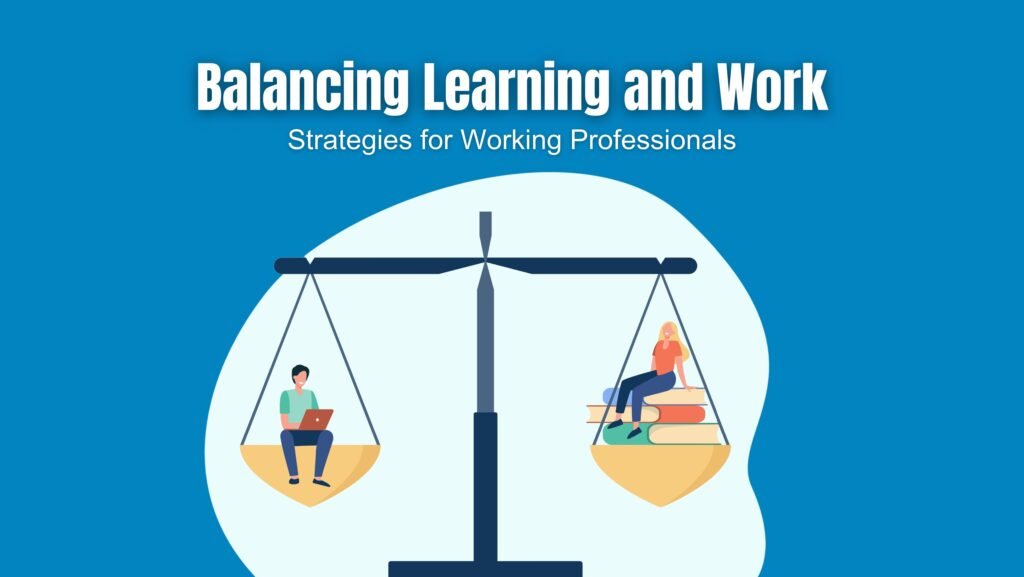Imagine being a mid-career professional trying to balance the demands of a full-time job while pursuing a master’s degree. You’re juggling deadlines at work, late-night study sessions, and precious family time slipping away. In such a scenario, the clock becomes your enemy, and the scale of work and learning hangs in the balance. Does this sound familiar?
According to a recent survey, over 70% of working professionals are actively seeking ways to advance their education while maintaining their jobs. This growing trend underscores the pressing need for strategies to effectively balance learning and work.
“The Challenge of Work Life Balance is without question one of the most significant struggles faced by Modern Man”—Stephen Covey
Have you ever wondered how some individuals manage to excel in their careers while continually improving their skillset? The answer lies in their ability to master the art of balancing learning and work.
In today’s fast-paced and knowledge-driven world, the journey of a working professional is no longer limited to climbing the corporate ladder. Continuous learning and personal development have become integral to professional success.
In this article, we will discuss the challenges faced by working professionals who aspire to further their education, upskill, or explore new career paths while holding down a full-time job.
Importance of Balancing Learning and Work
Finding equilibrium between your professional commitments and educational pursuits is not just about convenience; it’s a matter of survival in today’s competitive job market. Balancing learning and work has become a fundamental necessity, and here’s why:
- Career Advancement: In many industries, ongoing education is essential for career growth. Those who continuously learn and adapt are more likely to thrive in their chosen fields.
- Personal Growth: Beyond career benefits, learning enriches one’s life, boosts confidence, and opens new opportunities for personal development.
- Fulfillment: Fulfilling your educational aspirations while maintaining your job can bring a profound sense of accomplishment and satisfaction.
- Economic Security: In an ever-changing job landscape, the ability to learn and adapt can provide economic security, ensuring your skills remain relevant.
Striking a balance between learning and work is crucial for maintaining a healthy work-life balance, preserving relationships, and avoiding burnout.
The Challenges of Balancing Learning and Work
Working professionals who embark on the journey of learning alongside their careers often encounter a series of common challenges. Understanding these challenges is the first step towards effectively addressing them:
- Time Constraints: The perpetual battle for time is a central challenge. Balancing a full-time job with learning often means sacrificing leisure or family time.
- Workload and Stress: The demands of a job can be taxing, leading to high levels of stress and fatigue, which can hinder the learning process.
- Financial Considerations: Many individuals face financial constraints when pursuing education while working, as tuition fees and study materials can be costly.
- Lack of Support: A lack of support from employers, family, or peers can make the journey more challenging.
Balancing work and education isn’t just about personal inconvenience; it can significantly impact your career and well-being. The challenge can hinder career growth and lead to burnout, affecting your physical and mental health and personal relationships
Benefits of Continuing Education for Working Professionals
Continuing education offers working professionals numerous advantages, such as staying updated with industry trends, enhancing skills, and increasing job security. It can open doors to new career opportunities and boost earning potential, making it a valuable investment in one’s professional journey.
One of the key benefits of continuing education for working professionals is the enhancement of job performance. Here’s why it matters:
- Skill Development: Continuous learning equips professionals with new skills, up-to-date knowledge, and innovative tools to excel in their roles.
- Problem-Solving Abilities: Education fosters critical thinking and problem-solving skills, which are valuable assets in a rapidly changing work environment.
- Adaptability: Well-educated professionals are better equipped to adapt to changes in their industry, such as emerging technologies or market trends.
For many working professionals, advancing in their careers is a primary motivation for continuing education. Here’s how it can help:
- Competitive Edge: Additional qualifications and skills make professionals more competitive in the job market.
- Promotions and Raises: Employers often reward those who invest in their education with promotions and salary increases.
- Networking Opportunities: Education programs provide opportunities to expand one’s professional network, which can open doors to new career possibilities.
Beyond the professional realm, continuing education offers personal growth and fulfillment:
- Self-Discovery: Learning provides a chance to explore new interests, passions, and areas of expertise, contributing to personal growth.
- Sense of Achievement: Earning a degree or certification brings a sense of accomplishment and self-worth.
- Work-Life Balance: Balancing learning with work can enhance overall well-being by offering a sense of purpose and fulfillment.
Strategies for Balancing Learning and Work
Balancing your work responsibilities with your educational pursuits requires efficient time management. Here are some practical strategies to help you achieve this balance:
- Prioritizing Tasks:
Identifying your top priorities is crucial for effective time management. Here’s how to go about it:
- Recognize which tasks are the most critical in both your professional and educational life. What needs your immediate attention?
- Consider your short-term and long-term goals in both your job and learning. Ensure that your priorities are in sync with these objectives.
- Recognize that not all tasks carry the same weight. Allocate your time based on the impact each task has on your career and educational advancement.
- Creating a Well-Structured Schedule:
A well-structured schedule is the foundation of balancing work and learning effectively:
- To find the right balance, create a schedule that accounts for your job hours, commuting time, and personal commitments.
- Divide your day into manageable time blocks and allocate specific hours for work tasks, study sessions, and relaxation. Stick to these designated blocks to prevent overextension.
- Be aware of your natural energy patterns. Schedule demanding tasks during the times of the day when you are most alert and focused to maximize productivity.
- Utilizing Time Management Tools:
Various time management tools and apps can significantly enhance your productivity:
- Calendar Apps: Digital calendar apps like Google Calendar or Apple Calendar help you plan and visualize your schedule. Set reminders for crucial deadlines and appointments.
- Task Management Apps: Tools like Trello, Asana, or Todoist are invaluable for organizing your to-do lists, tracking your progress, and collaborating with others when necessary.
- Time Tracking Apps: These apps provide insights into how you spend your time, helping you make adjustments for better efficiency.
It’s essential to regularly review and update your schedule to accommodate changing work or educational demands. Effective time management is a continuous effort that can help you maintain a healthy balance between your career and educational goals.
Conclusion
So to conclude, finding the right balance between your job and learning is really important. It’s something you can do, and it can make a big difference in your life. Even though it might be tough, the benefits like doing better at work and feeling good about your personal growth are worth it.
To make it work, you can try managing your time better, taking advantage of online learning, and talking to your boss about support. By doing these things, you can have a job and learn new things at the same time. It’s not just good for you, it’s also good for the world because you’ll be more successful and helpful to others. So, keep going and find that balance!







